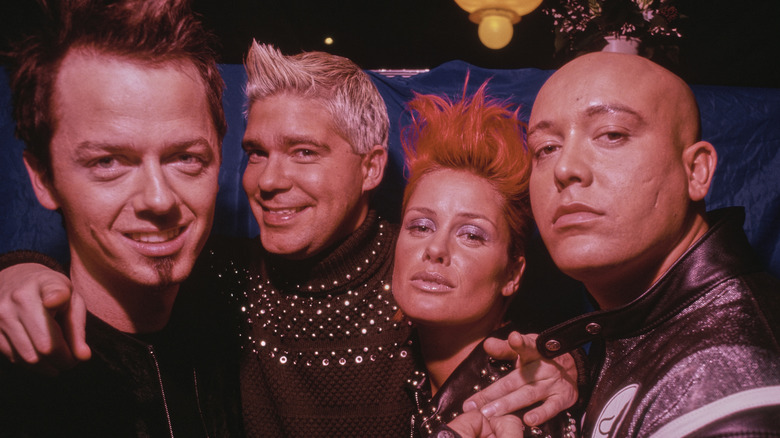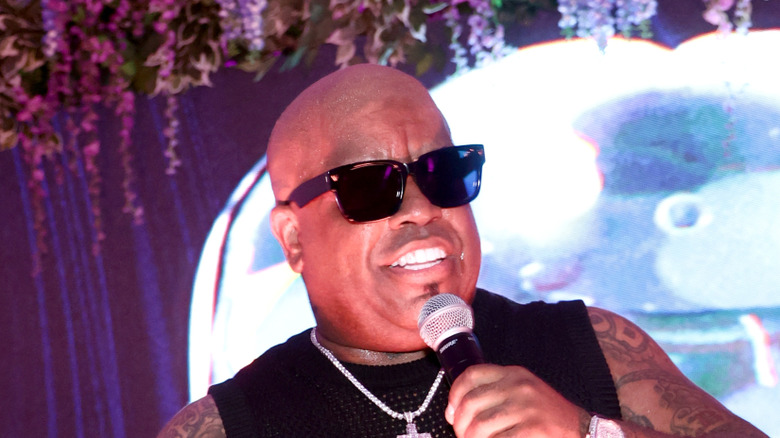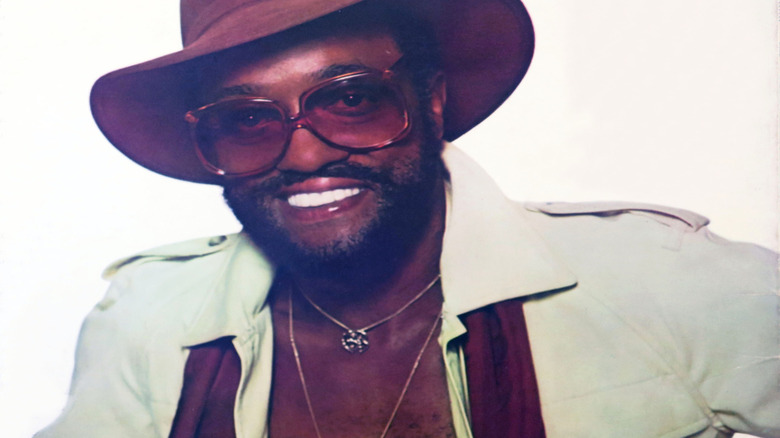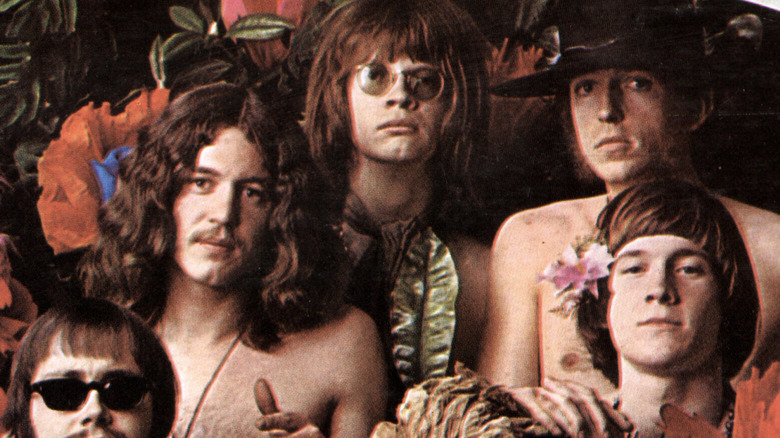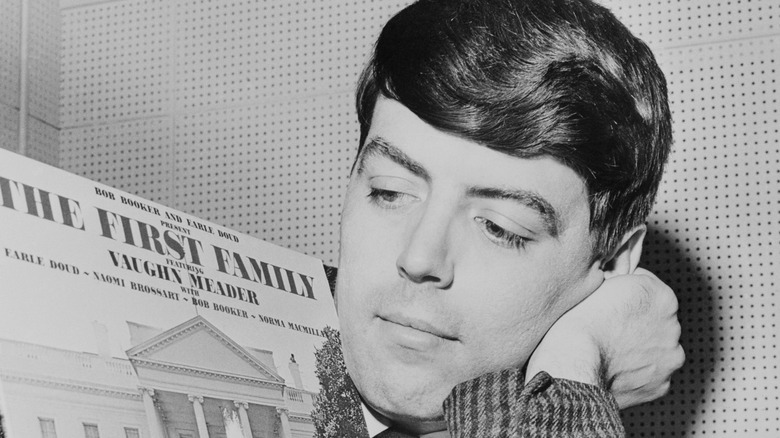Moments That Destroyed The Careers Of One-Hit Wonders
We may receive a commission on purchases made from links.
For someone who has dedicated their professional life to music, it must feel like nothing less than a personal miracle when, after years of creating and struggling, they finally break through and score a hit song. It must be just as confusing and frustrating when, after that major score, they never manage to do it again. This is the life of a one-hit wonder — a musical artist who makes it to the top of the charts or thereabouts exactly once.
Some tune-artist combos just sound or feel like they're going to be one-hit wonders. Maybe it's the power or impact of the song or how it capitalizes upon or creates a moment. It just feels bigger than the singer or band and makes it nearly impossible to follow. Other times, it feels like a hit song from a brand new artist is a revelation, showing great promise of much more to come, only for events outside of the musician's control — or their own acts of sabotage, intentional or accidentally — to ruin that possibility. Here are some of the most memorable one-hit wonders of the past six decades, destined to never repeat their initial or culturally overwhelming success because of a mistake or catastrophic interference.
Ashlee Simpson was caught lip-syncing
The late 1990s and early 2000s saw great success for Jessica Simpson, a belting pop diva in the vein of Christina Aguilera, Britney Spears, and other acts often played on MTV's "TRL" (until that show disappeared). And then the entertainment machinery fell into place for the singer's sister, Ashlee Simpson. Pitched as a vaguely edgy pop-rock act, Simpson starred on the 2004 MTV reality series "The Ashlee Simpson Show" to document the production of her first album. Then she landed a musical guest spot on "Saturday Night Live" to perform the "Autobiography" single "Pieces of Me," which would be the singer's debut and finale in the Top 10.
In her first performance slot, Simpson did "Pieces of Me." When Simpson took the stage again, she'd planned to sing another cut, until her own voice, singing "Pieces of Me," played from studio monitors. One of the weirdest things to ever happen on "Saturday Night Live," this revealed that Simpson had lip-synced earlier, using that same backing track.
A stunned Simpson improvised a little dance, and "SNL" cut to a commercial. At the end of the episode, she blamed her musicians. "My band started playing the wrong song, I didn't know what to do, so I did a little hoedown," she said. Simpson's manager-father, Joe Simpson, explained that his client-daughter didn't sing because her voice was shredded from an acid reflux attack. By the 2020s, the musician's story had changed again: Vocal cord nodules necessitated lip-synching.
Alison Gold's next song was even worse
Rebecca Black, also known as "the 'Friday' song girl," stepped back a bit after the backlash to her resoundingly savaged viral 2011 pop song about the weekend. Patrice Wilson, the writer-producer and founder of Ark Music Factory who was paid thousands by Black's mother to make her daughter a star, moved on to launch other young, aspiring female singers via the internet. In 2013, 11-year-old Alison Gold hit YouTube with the music video for "Chinese Food." Both song and clip are full of culturally appropriating and lazily mocking stereotypes regarding Asian people as Gold hangs out in a Chinese-American restaurant eating dishes like chow mein and wonton soup. Fueled by YouTube hits from viewers who had to see the potential disaster for themselves, "Chinese Food" landed at No. 29 on the Billboard pop chart.
After "Chinese Food," Gold and her team uploaded another music video to YouTube, but it was evidently so bad that it couldn't even inspire hate-watching or ironic viewing and thus missed the charts entirely. The clip for the song "ABCDEFG" depicts Gold trapped in a dollhouse and stalked by Wilson, who is dressed like Mr. Rogers and at one point slips a love potion into the singer's drink. YouTube, heeding complaints and commentary about how the material was creepy and unsettling, removed the "ABCDEFG" video.
Oliver Anthony revealed his political leanings
The rise of Oliver Anthony was due to a combination of old-fashioned grass roots and word-of-mouth efforts along with the modern phenomenon of internet virality. In August 2023, he released "Rich Men North of Richmond." The song was at first only released in the form of TikTok and YouTube videos featuring Anthony (who goes by Oliver Anthony Music professionally) singing the song and accompanying himself on acoustic guitar. Later that month, the unsigned folk singer with no previously commercially released music debuted his song at No. 1 on the Billboard Hot 100.
"Rich Men North of Richmond" was embraced as a protest anthem by conservatives. Fans of Anthony believed that he amplified their concerns and frustrations by calling out officials for doing nothing while economic and social policies collapsed. "The hopelessness and frustration of our times resonate in the response to this song," Anthony told Billboard.
Just days after "Rich Men North of Richmond" ascended the Hot 100 and the song was praised at a Republican presidential candidate debate, Anthony uploaded a 10-minute video to YouTube, clarifying that his personal politics didn't actually align with those of his hit's most vocal supporters. "It's aggravating seeing people on conservative news try to identify with me," Anthony said (per Variety). "It was funny seeing my song at the presidential debate, because I wrote that song about those people, you know," he later added. After potentially alienating his fan base, Anthony is yet to take a single above a No. 82 chart position.
Aqua got sued
Scandinavian dance-pop outfit Aqua was immediately and phenomenally successful in Europe. Its 1997 album "Aquarium" earned multi-platinum status around the continent, and catchy early singles "Roses are Red" and "My Oh My" topped the charts. It wasn't until "Barbie Girl" that Aqua made inroads with American record buyers. An extremely catchy novelty song, it's told from the point of view of Barbie, the beloved toy doll, except in a flirty, tongue-in-cheek, and suggestive manner. "Barbie Girl" reached the Top 10 in the U.S., but subsequent singles couldn't break into the Top 20.
Within days of the release of "Barbie Girl" as a commercial single, Mattel, the toymaker that produces Barbie, sued Aqua's label, MCA Records. The lawsuit overshadowed Aqua and what was supposed to be a fun and lightweight pop song. Mattel accused MCA and its artist of infringing on its Barbie trademarks by mentioning the doll. It also argued that the lyrics constituted defamation, specifically the lines in which Barbie self-identifies as a "Blonde bimbo" with a "life is plastic" philosophy." MCA countersued, citing defamation for disparaging the company through its legal filings. A U.S. District Court threw out the case in 2002.
Gotye purposely ended his career
Under the stage name Gotye, Australian musician Wouter De Backer recorded a series of eclectic pop albums that earned praise and sold well in his country of origin. In 2011 and 2012, the pleading and mournful ballad "Somebody That I Used to Know," recorded as a duet with New Zealand singer-songwriter Kimbra, proved to be a hit almost everywhere. It went to No. 1 in Australia, the U.K., Canada, France, Germany, Italy, Belgium, and the U.S. and won Gotye the Grammy Award for song of the year. In 2024, Billboard named it the most popular track of 2012. "Making Mirrors," the album that spawned "Somebody That I Used to Know," generated just one more single, "Eyes Wide Open," which flopped, peaking at No. 96 on the Hot 100.
So what really happened to Gotye? Wouter De Backer didn't have any more pop hits because he purposely took himself out of the music industry machine that would make it possible. In addition to asking video sites to not run advertising on clips of his songs and performances, thus demonetizing his content, he retired the Gotye brand and dedicated himself to creating the kind of music he used to make before his fluke hit. De Backer went back to the Basics, a band he created and occasionally recorded with in the 2000s, and started the experimental synthesizer-driven project Ondioline Orchestra
CeeLo Green was accused of a horrible crime
Over the span of a 30-year career in music, singer and rapper CeeLo Green has technically achieved one-hit wonder status three times. In the 1990s and 2000s, he was a member of the Southern rap group Goodie Mob, which landed exactly one song in the Top 40 — "Cell Therapy" in 1995. In the 2000s, Green teamed up with producer Danger Mouse to create the electro-soul duo Gnarls Barkley, responsible for 2006 No. 2 smash "Crazy." That song was so impactful that Green launched a stalled solo career, and he took the modernly profane '60s throwback "F*** You" to No. 2 in 2010.
Green then destroyed his image. In 2013, he entered a not guilty plea to a drug charge. He'd been on a date with a woman and reportedly supplied her with ecstasy. She later awoke in the musician's bed after he'd allegedly sexually assaulted her, an act that Green maintained was consensual. Later changing his plea to no contest to avoid serious prison time, Green aired his thoughts on sexual assault on Twitter, now known as X, in 2014. In a series of since deleted posts, Green argued that because victims of assault can't technically give consent if they're asleep, then they can't say no either, and their consent can be assumed.
Billy Paul released an incongruous follow-up
The sound of early 1970s soul music was synonymous with Philadelphia soul movement, or "The Sound of Philadelphia." It was perpetuated by acts like Teddy Pendergrass, the O'Jays, and acts on songwriting duo Kenneth Gamble and Leon Huff's label, Philadelphia International Records. And signee Billy Paul landed one of the biggest hits in Philadelphia soul history: The smooth and sultry "Me and Mrs. Jones," which went to No. 1 on both the R&B and pop charts in 1972.
After establishing himself as a performer of personal if not intimate grown-up soul and R&B, Paul tried to go in a different direction with his follow-up to "Me and Mrs. Jones." "Am I Black Enough for You?" was an overtly political and very thoughtful song about Black identity and the civil rights movement, written by Gamble and Huff. While it received minor airplay on American radio stations with predominantly Black audiences, it faltered in the pop market, topping out at No. 79 on the Hot 100. Paul never again saw the top of the pops.
The Lemon Pipers switched up their sound
A '60s garage rock band from Ohio called Ivan and the Sabres signed with Buddah Records in 1967. The move turned the five-piece into the Lemon Pipes, a group that embraced the spooky and progressive sounds of psychedelic rock but with a pop radio sensibility. The gambit worked, at least for a little while: "Green Tambourine" went to No. 1 in early 1968.
The members of the Lemon Pipers thought that "Green Tambourine," and the world's embrace of the song, established the band as a solid, forward-thinking rock band. Buddah Records had other ideas. It was primarily a label that trafficked in bubblegum pop — quickly written and recorded, watered-down pop rock suitable even for children. After "Green Tambourine," Buddah decided to shop "Rice Is Nice" to radio and retail stores, followed by "Jelly Jungle." The new band's new fans weren't interested in the generic sound of those songs, and both stalled in the lower-middle rungs of the pop chart.
Michelle Shocked came out against gay marriage
Amidst the scandalous world of the 1980s music industry, several honest, earnest, and confessional singer-songwriters emerged, and their folk-influenced songs resonated with large audiences. The movement included musicians like Sinead O'Connor, Tracy Chapman, and Michelle Shocked. The latter's 1988 major-label debut, "Short Sharp Shocked," reflected her compelling background and widely varying musical influences. It also generated "Anchorage," a moderate hit on the alternative rock, soft rock, and pop charts in the United States.
Shocked recorded 11 more albums and fostered a devoted fan base. And while she never released another hit single, the door that was open for a comeback may have been closed forever in 2013. During a club show in San Francisco, the musician delivered her thoughts on same-sex marriage in the wake of California's repeal of the restrictive Proposition 8. "When they stop Prop 8 and force priests at gunpoint to marry gays, it will be the downfall of civilization," Shocked said (via The Guardian). "You are going to leave here and tell people, 'Michelle Shocked said 'God hates f******."
The concert ended moments later after venue employees turned off the sound system and lights. A few days later, after some concert halls canceled Shocked appearances, the singer issued an apology, but the damage was done. "If I could repeat the evening, I would make a clearer distinction between a set of beliefs I abhor and my human sympathy for the folks who hold them," Shocked said (via ABC News).
Silento went to prison
In May 2015, Atlanta teenager Silento (born Richard Hawk) uploaded his independently recorded dance track "Watch Me (Whip/Nae Nae)" to various platforms that accept user-generated content, including SoundCloud and YouTube. The song quickly exploded, and it helped further popularize two dance crazes of recent years, the Whip and the Nae Nae. Silento's song flew up the charts, peaking at No. 2 on Billboard's R&B chart and No. 3 on the all-genre Hot 100. He'd never again land anything on another chart.
Silento didn't feel rushed to make the most out of his archetypal internet hit. He didn't come out with a full-length album, "Fresh Outta High School," until August 2018, more than three years after "Watch Me (Whip/Nae Nae)" had its moment. Then the rapper ran afoul of the law. In 2020, he was arrested twice, once for attacking two people with a hatchet and another time for driving charges. After Frederick Rooks was discovered dead from multiple gunshot wounds near his Atlanta home in January 2021, police arrested his cousin, Silento. The musician was indicted by a grand jury on charges including aggravated assault and felony murder. As of 2025, he's awaiting trial and sentencing.
Vaughn Meader's act died when the president did
In the run-up to the 1960 presidential election that he'd eventually win, John F. Kennedy became a well-known national figure. At the same time, Maine-born Vaughn Meader was getting his comedy career going, and audiences loved his impression of the future president. Meader even looked like Kennedy, and he incorporated the impression into his stand-up act until it was his entire act. In 1962, Meader portrayed Kennedy and a handful of actors played the president's relatives on the satirical sketch comedy album, "The First Family." In two weeks, the LP sold 1.2 million copies. Within a year, Meader's LP sold a then-record 7.5 million copies. Meader earned three Grammy nominations for "The First Family," winning for best comedy performance and album of the year.
The horrific assassination of JFK on November 22, 1963 ruined Meader's career. As a traumatized nation mourned, Meader was essentially blacklisted. His upcoming appearances at comedy clubs and on TV variety shows were all canceled, and the just-released sequel album "The First Family Volume Two" was taken out of record stores. While Meader could do things besides imitate Kennedy, he was so closely associated with the assassinated president that nobody wanted to see his face. His entertainment career from late 1963 until his death in 2004 consisted of singing and playing the piano in nightclubs.




